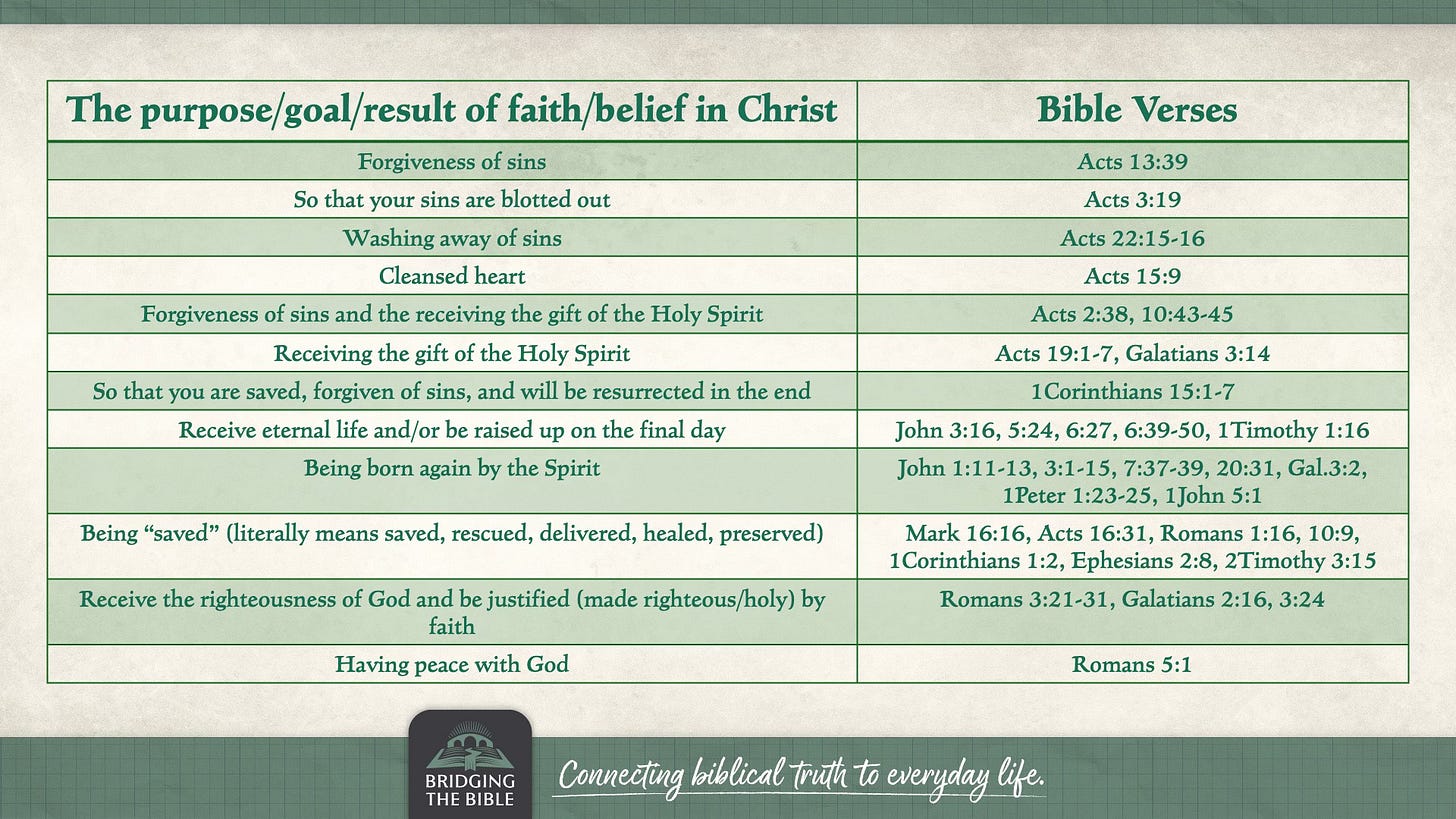Why Believing in Jesus is Less About Going to Heaven Than You Think
Grounded in the Gospel part six. The Gospel is More about Relationship Than it is About Heaven.
“If you died today do you know for sure whether you are going to heaven?”
“Jesus is the only way to heaven.”
“Believe in Jesus so that you can go to heaven.”
You might hear those common phrases in broad Christian culture, but you won’t find them in the Bible. There is not a single verse in the Bible that explicitly says to trust in Jesus as Lord and Savior so that you can go to heaven.
A couple days ago I looked at a concordance and scanned every New Testament Bible verse that has the word “heaven” in it. There was not a single verse that explicitly connected saving faith with “heaven.” I also asked a trusted scholarly friend of mine who has taught Bible classes whether he thinks there is a single Bible verse that says to trust in Christ for the purpose of going to heaven, and he looked at me with a smirk of surprise and agreed initially with my observation. I then did a survey of major passages in the New Testament that speak explicitly of believing in Jesus with an outcome/goal in mind. I have put those verses in the chart below. The noteworthy thing is none of these passages explicitly link faith in Jesus to the goal of going to heaven.
You might be asking ‘Yeah, but doesn’t Jesus tell the thief on the cross that he is going to heaven because of his faith?’ Jesus does tell the thief on the cross in Luke 23:43 that “today you will be with me in paradise.” However, the emphasis is still the relationship, not so much the place. Jesus told the thief “you will be with me in paradise.” The thief—because of his faith in Jesus—will be with Jesus for eternity. The very reason it’s paradise is because of the presence of God.
The thief’s faith was not a result of a heaven carrot being dangled in front of him. There was no carrot. Just faith. The thief on the cross was rebuking those who were mocking Jesus out of unbelief. The thief had a fear of God and an acknowledgment of his own sin which deserved death. The thief knew Jesus had not sinned and knew Jesus was the Messiah. Jesus’ comment about heaven is almost a word of comfort to a man taking his last breath. I put the thief on the cross passage in a different category than the passages in the chart that are explicitly exhorting us to trust Jesus by faith for specific reasons. It is true believers go to heaven, which Luke 23:43 certainly affirms. What I’m addressing is the point of emphasis and the reason behind trusting Christ.
I do not have an agenda to belittle heaven—because heaven is real and the Bible does talk about it—but I do have an agenda to clarify what the Gospel is and isn’t.
Notice what’s missing from this “gospel of heaven” that says, “believe in Jesus so that I can go to heaven.” What’s missing is anything about our sinfulness. What’s missing is we have sinned against a holy God. What’s missing is that the wages of sin is death. What’s missing is anything about our need for Jesus, that Jesus is the Son of God and the perfect sacrificial Lamb, our atoning sacrifice who shed His perfect blood for us. What’s missing is the fact that in Christ God was reconciling the world (us) to Himself (2Corinthians 5:19). What’s missing is knowing God. What’s missing is a commitment to follow Jesus as Lord. What’s missing is transformation into Christlikeness from the inside out through the grace of God by the Spirit of God. But hey, at least we got our ticket punched to heaven. That’s what really matters, right?
Popular American Christian culture has made the Gospel heaven-oriented rather than God-oriented, rather than relationship-oriented. Is the Good News of the crucified and risen Jesus of Nazareth about restoring us to heaven, or about restoring us to proper relationship with our creator? Do we just want to feel warm and fuzzy about where we might be in the future, or do we want to know God and love Him for the rest of time? Do we believe Jesus is who He says He is, or do we just want heaven?
What makes a heaven-oriented gospel so palatable for us believers is that it contains some measure of truth to it. Is it true that a Christian goes to heaven when they die? Yes. Is there a future aspect to salvation? Absolutely. Is it true that our eternal future destination is based on whether we trust Jesus by faith? Yes. But discernment is not knowing the difference between right and wrong. Discernment is knowing the difference between right and almost right. Just because heaven is discussed in the Bible, and just because Christians have an eternal future with God secured, does not necessarily mean that heaven is supposed to be emphasized. Making the Good News of the crucified and risen Christ all about us going to heaven is to make the Gospel about us instead of about God.
God did not put on flesh and willingly be crucified so that we could feel good about the punched heaven-card in our pocket we get to carry around. He put on flesh and died for us to reconcile us to the Father, because He loves us. The Bible doesn’t say Jesus is the only way to heaven. It says Jesus is the only way to the Father (John 14:6). The entire point of trusting Jesus by faith is so that we can be forgiven and enter into right relationship with Him. The point of believing in Jesus is so that God can redeem us, make us holy by crediting Jesus’ holiness as our own. The goal of saving faith is to be born again by the Holy Spirit, being made a child of God who gets to enjoy restored relationship with God as our Father. That relationship doesn’t and shouldn’t wait until heaven. It can and should start now.
The so-called “heaven-oriented gospel” pushes relationship with God into the future—or bypasses relationship altogether. If you consider yourself a Christian, please consider the following questions:
Do you have a relationship with God?
Do you love Jesus?
Do you know the love of God in Christ?
Do you know the Lord?
Do you want to know Him?
Do you read your Bible to know Him?
If you consider yourself a Christian, but answered “no” to those questions, perhaps the Good News you were told was news about heaven rather than the news about Jesus. I would encourage you to read about the four parts of the Gospel, and also read about how the Gospel reveals a loving Father who gives grace to make you His kid.
Jesus said in John 17:3,
“And this is eternal life, that they know you, the only true God, and Jesus Christ whom you have sent.”
Eternal life is knowing God. Eternal life is not really about being in a place called heaven as much as it’s about being with God in relationship with Him in His presence. If you don’t know Him and love Him now, you probably won’t like the future age to come that most of us call “heaven.” When Jesus returns at His Second Coming, there will be the final judgement, and then the creation of the new heaven and new earth. Our eternal life from there on out will be with new bodies on a new earth in the new Jerusalem. As my scholarly friend puts it, “We will not be floating around on a cloud playing a harp forever and ever.” We won’t have halos and angel wings. We will have real tangible lives where we will continue to worship and glorify the Lord in perfect unhindered friendship with Him. In this eternal state of the future age, God’s Law prevails perfectly, His reign will be total, sin will be no more, and we will have complete access to the Lord we love.
Another Bible passage that describes the transformative relationship a Christian has with God is 1John 5:1-3, which says,
“Everyone who believes that Jesus is the Christ has been born of God, and everyone who loves the Father loves whoever has been born of Him. By this we know that we love the children of God, when we love God and obey his commandments. For this is the love of God, that we keep his commandments. And his commandments are not burdensome.”
A believer is someone who has been transformed. They have been born of God, love God, and obey God, and that impacts how we then love others. That’s a renewed relationship and an ongoing relationship.
The Gospel is about relationship with God, and it’s about eternal relationship with Him. That is much more than simply believing in Jesus so that you can get your convenient ticket-to-heaven card punched.
About the Author
Colin Rieke is a regular guy whose life was really messed up before finding wholeness in God’s grace through Jesus Christ. Colin is a writer/podcaster, loves having conversations with people about truth, and aspires to be a vocational pastor-theologian. Colin reads theology, church history, and biblical counseling books in his spare time for fun, and he is passionate about offering biblical solutions to people’s real life challenges so that they live healthy lives transformed by God’s grace. Colin became a Christian as an adult around the time he graduated from college with a BA in Philosophy, then he met his wife Rachelle at church, and they got married in 2016. Colin graduated from Phoenix Seminary in 2025 with an MA in Christian Ministry.








